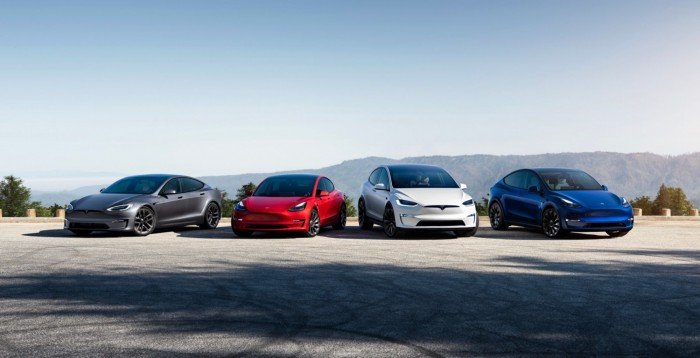Tesla delivers 936,000 new cars in 2021, up 87% year-on-year

On January 3 news, on Sunday, local time in the United States, electric car manufacturer Tesla announced the fourth quarter of 2021 and the full year of car sales and delivery data. This is also the company’s sixth consecutive quarter to release record sales. According to the data, Tesla delivered 308,600 electric vehicles in the fourth quarter of 2021, breaking the previous single-quarter record and exceeding analyst expectations.
During the same period, the company produced a total of 305,840 all-electric vehicles. For the whole year, Tesla delivered a total of 936,172 vehicles, an increase of 87% from 499,647 in 2020. In the third quarter of 2021, Tesla delivered 241,300 vehicles, which was Tesla’s previous best quarter. According to a survey by market research firm FactSet, Wall Street analysts had previously expected Tesla to deliver 267,000 vehicles in the fourth quarter and approximately 897,000 vehicles for the full year of 2021.
Gene Munster, the managing partner of the venture capital firm Loup Ventures, said on Sunday: “Tesla has overcome all difficulties. First, its demand has grown by leaps and bounds, and second, they have done a good job in meeting demand. “Munster expects Tesla’s deliveries to increase to 1.3 million vehicles this year, slightly lower than the 1.5 million vehicles previously expected by Deutsche Bank. Data shows that Tesla’s fourth-quarter and full-year new car deliveries are close to the figures provided by its CEO Elon Musk. Among them, the delivery figures of Tesla’s flagship models Model S sedan and Model X SUV are slightly lower than 3% of the company’s total deliveries in 2021. In the fourth quarter of 2021, deliveries of Model 3 and Model Y were 296,850, and for the whole year, 911,208 were delivered. Tesla produces Model 3 and Model Y cars in Shanghai and Fremont, California, but only produces Model X and Model S in Fremont.
Get rid of supply shortage At Tesla’s 2021 annual shareholder meeting, Musk lamented that there were problems in the supply chain this year, and it was difficult to obtain enough microchips and other components. But Musk said that Tesla has never lowered its production forecasts with suppliers to support its rapid growth plan, which helped it weather the chip shortage crisis. In the global new crown pneumonia epidemic, Tesla has increased the delivery of vehicles by increasing the output of its first overseas factory in Shanghai and technological transformation of its cars produced in Fremont, California, completely abandoning certain parts and components. quantity.
In addition, Tesla designed many chips internally and reprogrammed the software to use less scarce chips. It is worth noting that Tesla announced in May last year that it would remove radar sensors from Model 3 and Model Y cars manufactured for North American customers. These vehicles now rely on camera-based vision systems to support Tesla’s driver assistance functions, such as traffic regulation cruise control, or automatic lane keeping. Look to the future Musk announced that he hopes to increase Tesla’s car sales to 20 million a year in the next nine years. In order to achieve this growth, Tesla is preparing to start production of Model Y crossovers at its new plant in Austin, Texas this year. Since then, the company hopes that the plant in Brandenburg, Germany will also be put into production as soon as possible. Tesla recently moved its headquarters to Texas. Musk announced this plan in October 2021, and Tesla officially completed the relocation of its headquarters in early December.
Last month, Musk wrote on Twitter with approximately 68.4 million followers: “Over time, the investment in the Texas factory will exceed 10 billion U.S. dollars, creating at least 20,000 direct jobs and 100,000 indirect jobs. Employment opportunities.” According to public filing documents, Tesla plans to initially spend $1.6 billion to build a factory in Austin, Texas, and the first phase of the project is currently underway. Tesla predicts that with new plants near Austin, Texas, and Berlin that will be fully operational in 2022, at least in the next few years, Tesla’s annual growth rate of global sales should reach 50% or more. Despite rapid progress in plant construction in Texas, Tesla has postponed plans to start mass production of the CyberTruck electric pickup truck until 2023. At the same time, the company’s electric heavy-duty truck Semi and the new sports car Roadster are still under development.
Industry Outlook Tesla currently dominates the sales of battery electric vehicles in the United States and most parts of the world. But as competitors launch their own all-electric models one after another, the company is expected to lose more market share. For example, Toyota told investors that the company will invest 35 billion U.S. dollars to launch 30 battery electric vehicles by 2030. Rivian recently started delivering its electric pickup trucks and SUVs. After receiving 200,000 orders, Ford stopped accepting bookings for its electric pickup truck F-150 Lightning.
Tesla’s sales are expected to continue to rise as the overall demand for electric vehicles grows, which is partly driven by climate regulation. In order to reduce air pollution caused by traffic, US states, including California and New York, are following in the footsteps of several European countries and cities and setting deadlines for the ban on the sale of fuel vehicles. Wedbush Securities analyst Dan Ives said: “The shortage of chips is a major threat to the automotive industry and global logistics, but Tesla’s delivery figures are eye-popping.” Other automakers are expected to When the US market data is released this week, sales decline will be reported. Tesla only reports global sales, but across the industry, global car sales are expected to generally decline in the fourth quarter.
Cox Automotive predicts that overall U.S. car sales will fall by 24% in the fourth quarter. The reason is that computer chip shortages have caused factories to temporarily close, limit dealers’ car inventories, and push car prices to record highs. Record level. But according to Alix Partners’ forecasts, by 2030, approximately 24% of new cars sold globally may be fully electric. Tesla has also brought huge returns to investors, and its stock price has risen by 52% in 2021. Although this is not large compared to the 743% growth share in 2020, it is still better than most automakers, including most other pure electric vehicle companies. This is enough to make Tesla’s market value more than the combined market value of the world’s 12 largest automakers, and it also makes it the sixth company in history to have a market value of more than $1 trillion.
Research Snipers is currently covering all technology news including Google, Apple, Android, Xiaomi, Huawei, Samsung News, and More. Research Snipers has decade of experience in breaking technology news, covering latest trends in tech news, and recent developments.









